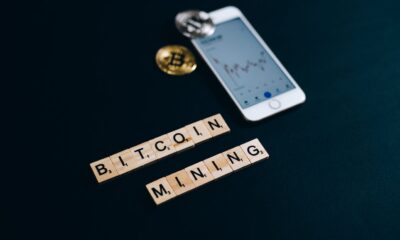Crypto
Bitcoin Miners Say Mining Dogeoin and Litecoin Is More Profitable
BIT Mining diversified into Dogecoin and Litecoin mining post-Bitcoin halving, finding it nearly three times more profitable than BTC alone. Facing high energy costs and halved block rewards, miners innovate with efficient hardware and alternative revenue streams. Rising hashrates across networks signal strong competition, while regulatory shifts and market rallies drive optimism for Litecoin and Dogecoin’s momentum.

Bitcoin miners are faced with the challenge of adjusting their business model after the BTC halving in April. BIT Mining now reports that it is also using equipment for Litecoin and Dogecoin, thereby increasing profits.
The Bitcoin halving in April hardly affected the price curve of BTC, but it significantly changed the business basis for miners. Since then, Bitcoin has only received 3.125 BTC for generating a block, previously it was 6.25. Even before the halving, it was therefore noticeable that Bitcoin miners were updating their hardware and thinking about takeovers. According to a press release, the listed company BIT Mining has followed a different strategy and has started mining not only Bitcoin, but also Dogecoin (DOGE) and Litecoin (LTC), as well as BEL.
And lo and behold: The expansion to Litecoin and Dogecoin has proven to be almost three times as profitable as Bitcoin mining alone, writes BIT Mining. Equipment that enables parallel mining is used for DOGE and LTC (and BEL). As of November 27, BIT Mining said it accounted for 1.32 percent of the hashrate in the Dogecoin and Litecoin networks.
The hashrate measures how much computing capacity is connected to networks such as Bitcoin. Blockchain data shows that the hashrate has not only risen to record levels for Bitcoin, but also for Dogecoin and Litecoin. This indicates strong competition.
Bitcoin miners face major challenges despite BTC rally
Bitcoin miners don’t like to reveal their detailed calculations. According to estimates, since the 2024 halving, Bitcoin prices of at least almost $40,000 are needed to run their business profitably. BIT Mining points to the takeover of Bee Computing in 2021, which enabled the company to produce its own hardware that is particularly energy efficient. The price of electricity is one of the main factors in Bitcoin mining and the reason why it is not worth becoming a BTC miner in Germany.
BIT Mining also quotes its vice president Youwei Yang, who highlights the recent rally of Litecoin and Dogecoin. The influence of “Dogefather” Elon Musk was evident there, as were upcoming changes to the regulatory environment due to Donald Trump’s election victory, according to Youwei Yang.
Dogecoin () has gained around 110 percent in the last 30 days, Litecoin almost 100 percent. Bitcoin has only gained 30 percent in the price curve in the same period, despite new all-time highs. BIT Mining is optimistic that LTC and DOGE will be able to maintain their momentum in the coming year.
Conclusion: Bitcoin Miner is multi-pronged and doing well – model of the future?
Other Bitcoin miners such as Hut 8 Mining see opportunities in making their highly sophisticated special computers available for services in the field of artificial intelligence (AI). It remains to be seen whether this will generate profits. BIT Mining is making its way by combining its own hardware and expanding the field of application of Bitcoin to include Litecoin and Dogecoin.
The BIT Mining share BTCM reacted cautiously positively with a good 10 percent increase to the news of increased profitability, but is miles away from the times when Bitcoin miners received twice or four times as many BTC per block as they do now.
This shows how keenly Bitcoin miners now have to calculate and allows the forecast: tough competition among the large professional crypto miners is encouraging the search for additional sources of income in addition to Bitcoin mining.
__
(Featured image by Kanchanara via Unsplash)
DISCLAIMER: This article was written by a third party contributor and does not reflect the opinion of Born2Invest, its management, staff or its associates. Please review our disclaimer for more information.
This article may include forward-looking statements. These forward-looking statements generally are identified by the words “believe,” “project,” “estimate,” “become,” “plan,” “will,” and similar expressions. These forward-looking statements involve known and unknown risks as well as uncertainties, including those discussed in the following cautionary statements and elsewhere in this article and on this site. Although the Company may believe that its expectations are based on reasonable assumptions, the actual results that the Company may achieve may differ materially from any forward-looking statements, which reflect the opinions of the management of the Company only as of the date hereof. Additionally, please make sure to read these important disclosures.
First published in BLOCK-BUILDERS.DE. A third-party contributor translated and adapted the article from the original. In case of discrepancy, the original will prevail.
Although we made reasonable efforts to provide accurate translations, some parts may be incorrect. Born2Invest assumes no responsibility for errors, omissions or ambiguities in the translations provided on this website. Any person or entity relying on translated content does so at their own risk. Born2Invest is not responsible for losses caused by such reliance on the accuracy or reliability of translated information. If you wish to report an error or inaccuracy in the translation, we encourage you to contact us

-

 Crowdfunding2 weeks ago
Crowdfunding2 weeks agoSpain’s Real Estate Crowdfunding Boom: Opportunity, Access, and Hidden Risks
-

 Fintech6 days ago
Fintech6 days agoDruo Doubles Processed Volume and Targets Global Expansion by 2026
-

 Impact Investing2 weeks ago
Impact Investing2 weeks agoIntesa Sanpaolo’s 2026–2029 Growth and ESG Strategy
-

 Business3 days ago
Business3 days agoTopRanked.io Weekly Affiliate Digest: What’s Hot in Affiliate Marketing [Health Trader Affiliate Program Review]
























